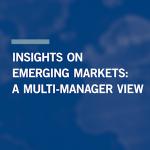
Emerging Markets: A Multi-Manager View
Portfolio managers from Kayne Anderson Rudnick, NFJ Investment Group, Stone Harbor Investment Partners, Sustainable Growth Advisers, and Virtus Systematic share their views on emerging markets, including the impact of the Federal Reserve, current valuations, and why investors might be interested now.
